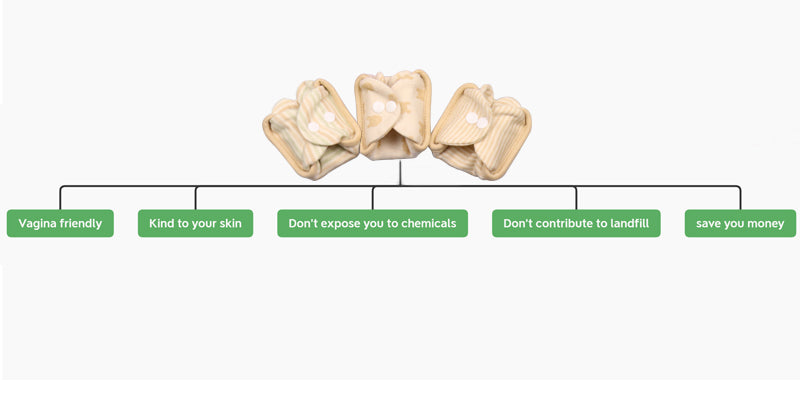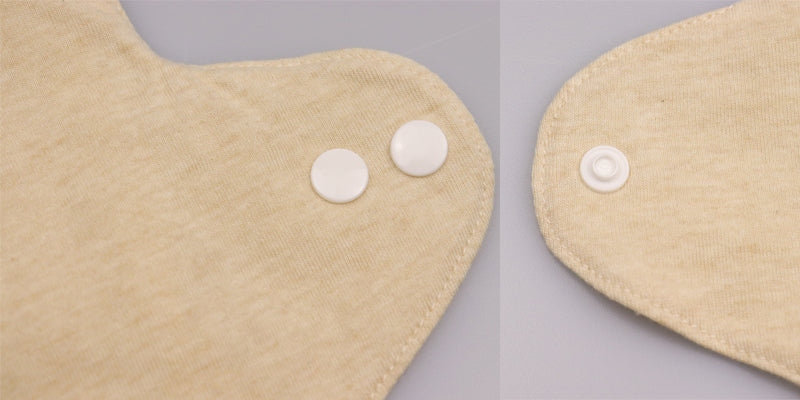5 Reusable Menstrual Pads Benefits, Why You Should Switch

Are you considering switching reusable menstrual pads but feel unsure if it’s for you? Disposable pads and tampons are easy, familiar, and convenient. So why are women everywhere taking the plunge and moving to reusables? Let’s jump in and explore why reusable menstrual pads are an excellent alternative to disposable menstrual products.
1.They’re vagina friendly
To understand what makes something vagina friendly, we need to talk about your vaginal microbiome.
You might not know it, but we have a collection of trillions of tiny microorganisms that live in our vagina. These microorganisms form part of our microbiome and have a powerful influence on our wellbeing.
Vaginal trouble can start when we disrupt the harmony of our microbiome. If we create an environment where bacteria can quickly multiply, we increase our risk of an infection such as bacterial vaginosis or thrush.

When made from the right materials, reusable sanitary pads are extremely vulva friendly. Cotton is the perfect material for reusable sanitary pads as it absorbs the moisture of blood and sweat instead of repelling it. At the same time, cotton is breathable. These qualities mean reusable sanitary pads won’t disrupt the balance of your vaginal microbiome.
2.They’re kind to your skin
The skin of your vagina is very delicate and deserves gentle treatment. Reusable period pads offer just this.
On the other hand, some women report disposable sanitary pads can irritate. It’s not surprising when you take a closer look at the construction of a disposable pad. Inside these pads you may find compounds called polyolefins (commonly used in ropes). You may also find an absorbent foam, gel, or wood celluloses in the ‘absorbent core’ of your disposable pads. Next are adhesives and synthetic fragrances. With all these components, it’s not surprising disposable pads can leave some women with skin irritation.
Good quality reusable period pads have a simple design and only use a few materials that are gentle on skin. Consider the construction of our pads at LUCKYPADS reusable period pads — the top and absorption layers are unbleached and undyed organic cotton. You won’t find wood cellulose, gels, chemicals, fragrances, or adhesives.
3.They don’t expose you to chemicals
Disposable pads and tampons are available everywhere, so it’s natural to assume they’re safe to use. But when you delve into the information available, a different story unfolds.
Independent studies by women’s health organizations have identified chemicals of concern like dioxin, carcinogens, and reproductive toxins in commonly available disposable sanitary tampons and pads.
It also appears that despite their mainstream use, no research declares disposable pads and tampons absolutely safe. When you consider how many sanitary pads and tampons a woman may use in her lifetime (a common estimate is 12,000), that’s alarming.
Makers of feminine hygiene products suggest disposable pads and tampons are safe because they either don’t contain potentially hazardous chemicals or have been found to contain only trace amounts of these substances. However, health advocates suggest there isn’t enough research to back-up these safety claims. In particular, they’ve highlighted that studies looking at the long term effects of using disposable pads and tampons are lacking. The absence of thorough research means we don’t know the impact using these products will have over our lifetime.
When made with the right materials, organic menstrual pads can offer a simple and safe alternative to disposable sanitary pads. Look for products (such as LUCKYPADS) made using organic, undyed, and unbleached natural materials. Such products can offer the convenience of disposable pads without health concerns.

4.They don’t contribute to landfill
Disposable sanitary pads and tampons directly add to our landfill problem. When you consider a woman may use 12,000 disposable menstrual products in her lifetime, you start to get a sense of the scale of waste we’re generating. Our love of convenience and disposable products is devastating to our world.
It doesn’t have to be this way.
It is possible to construct cloth menstrual pads from materials that are either biodegradable or recyclable. For example, in our LUCKPADS cloth menstrual pads, we use cotton, which takes 12 months to biodegrade when composted. The LUCKYPADS cloth menstrual pads also have a waterproof lining made from biodegradable TPU. This lining breaks down within 3 to 5 years when composted.
The plastic snaps used in LUCKYPADS cloth menstrual pads aren’t biodegradable, but they are recyclable. So before disposing of your LUCKYPADS cloth menstrual pads, you can cut the snaps out and recycle them separately.

By switching to cloth menstrual pads, you’re declaring you care about the environment. You’re also taking positive practical steps to reduce our landfill.
5.They’ll save you money
Moving from disposable products to washable menstrual pads will save you a considerable amount of money. Let’s assume you have 12 periods a year and you spend somewhere between 15 and 20 dollars per menstrual cycle. Based on this, you’ll have easily covered the cost of investing in washable menstrual pads in just nine short months. If you consider your savings over five years, we’re talking about saving hundreds of dollars.
Is it time to make the switch?
The benefits of using reusable menstrual pads are compelling. Reusable menstrual pads are a better choice for our bodies. They are moving us towards a more sustainable way of living and, at the same time, can save us money. Is it time to make the switch?

Janet,
I have just switched to cloth pads myself. I have had two children and I was worried if cloth pads wouldn’t handle my flow. I ordered a pack of XL overnight cloth pads and I’ve had zero leaks or problems! And it’s much more comfortable than disposable pads! I’m glad I switched and hope this helps you!
I’m looking for some pads that would that’s wide and long enough to cover front to back.